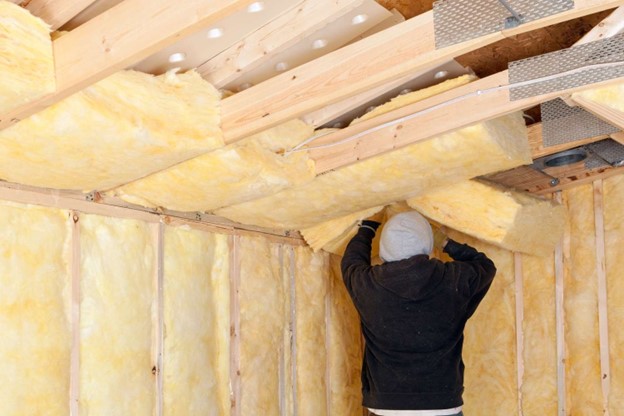Why Is Insulation Thickness Important

Insulation is an important part of any building or structure, as it helps to maintain a comfortable and consistent indoor temperature. Insulation thickness plays a crucial role in the overall effectiveness of insulation, and it is often overlooked by many people.
In this article, we will discuss the importance of insulation thickness and how it affects energy efficiency, cost savings, and environmental impact. We will also explore different types of insulation materials and their recommended thickness levels for various applications.
What Is Insulation Thickness?
Insulation thickness refers to the depth or measurement of the insulating material used in a building’s walls, floors, and ceilings. This thickness is vital because it directly impacts the material's ability to resist heat transfer. A thicker insulation layer creates a greater barrier against temperature fluctuations, which can lead to increased energy efficiency and reduced heating and cooling costs.
The effectiveness of insulation is often measured by its R-value, which indicates its thermal resistance. Generally, the higher the R-value, the better the insulation's performance at resisting heat flow.
Different building types and climates have specific recommendations for insulation thickness to optimally achieve energy savings. For instance, homes in colder climates typically require thicker insulation compared to those in warmer regions. Understanding these specifications ensures that insulation meets performance standards, providing comfort and decreasing energy waste.
Importance for Energy Efficiency
One of the main reasons why insulation thickness is important is its impact on energy efficiency. Adequate insulation with proper thickness can significantly reduce heating and cooling costs by minimizing heat loss during cold weather or heat gain during hot weather. This means that the HVAC system doesn't have to work as hard or use as much energy, resulting in lower utility bills and reduced carbon footprint.
Inadequate insulation thickness or gaps in insulation can lead to air leaks and thermal bridging, reducing efficiency and increasing energy waste. Thicker insulation helps to prevent these issues by creating a continuous barrier against heat transfer.
Reasons Why Insulation Thickness Is Crucial
There are several reasons why proper insulation thickness is crucial for buildings and structures:
Cost savings
Investing in the appropriate insulation thickness can lead to significant long-term cost savings for homeowners and businesses alike. By minimizing heat loss in winter and heat gain in summer, adequate insulation thickness reduces the reliance on heating and cooling systems, thus lowering energy bills.
Over time, the savings on utility costs can offset the initial investment in high-quality insulation materials and installation. Furthermore, buildings with proper insulation thickness often appreciate in value due to their energy-efficient features, making them more attractive to potential buyers.
In addition, many regions offer incentives or rebates for energy-efficient upgrades, further enhancing the financial benefits of choosing the right insulation thickness.
Comfort
Proper insulation thickness plays a vital role in maintaining a comfortable indoor environment. It regulates temperature fluctuations, ensuring that spaces remain warm during winter months and cool in the summer.
This consistency not only enhances comfort but also improves overall well-being, as occupants are less likely to experience drafts or temperature swings that can lead to discomfort. Additionally, effective insulation can reduce noise transmission from outside, creating a quieter and more serene atmosphere within the home or building.
Investing in the right insulation thickness contributes to an enjoyable living or working space, allowing individuals to focus better and feel at ease in their surroundings. Ultimately, comfort is one of the essential benefits of ensuring proper insulation thickness in any structure.
Environmental impact
Buildings account for a significant portion of energy consumption globally, and their carbon footprint can be reduced by using adequate insulation thickness. By decreasing the need for heating and cooling systems, proper insulation contributes to lower greenhouse gas emissions.
Additionally, high-quality insulation materials are often made from recycled or renewable resources, making them more environmentally friendly. Choosing thicker insulation also means that less material is needed to achieve the desired R-value, further reducing the environmental impact of production and transportation.
Building code compliance
Most building codes have strict requirements for insulation thickness in various parts of a structure. These regulations are meant to ensure that buildings meet certain performance standards, promoting energy efficiency, safety, and comfort.
Failing to comply with these codes can result in costly fines or delays in obtaining necessary permits. Builders and contractors must understand and follow the recommended insulation thickness levels specific to their location to avoid any issues with building code compliance.
So, these are the main reasons why insulation thickness is crucial for energy efficiency, cost savings, comfort, environmental impact and building code compliance. By understanding and considering these factors, individuals can make informed decisions when choosing the appropriate insulation thickness for their building projects.
Are There Exceptions to Insulation Thickness Guidelines?
While insulation thickness guidelines are generally based on specific building types and climates, there may be exceptions depending on various factors. For example, older buildings may have unique designs or construction methods that require customized approaches for proper insulation installation.
The presence of certain elements such as ductwork, pipes, or wiring may also impact the recommended insulation thickness. In these cases, it is essential to consult with a professional or conduct thorough research to determine the best course of action.
Furthermore, some regions may have updated building codes or incentives for using thicker insulation than previously recommended. It is crucial to stay informed and up-to-date on any changes in regulations or guidelines to ensure compliance and maximize energy efficiency.
Finally, individual preferences and budget constraints may also play a role in deciding on the appropriate insulation thickness. However, it is essential to carefully consider the potential long-term benefits and cost savings of investing in thicker insulation versus opting for a thinner option.
Why A Professional Company Should Install Your Insulation
Proper insulation installation requires knowledge, experience, and specific equipment. While it may be tempting to attempt a DIY approach or hire non-professionals for cost-saving purposes, it is highly recommended to choose a reputable and professional company for insulation installation.
Professional companies have trained and certified technicians who understand the intricacies of different types of insulation materials and their proper installation methods. They also have access to specialized tools that ensure precise and efficient installation.
Moreover, working with a professional company assures that the insulation is being installed correctly according to building codes and guidelines. This not only ensures energy efficiency but also avoids potential issues such as air leaks or pests entering through improperly installed insulation.
Lastly, professional companies often offer warranties and guarantees for their work, giving the building owner peace of mind and added protection in case any issues arise. By choosing a professional company to install insulation, individuals can be confident in the quality and longevity of the installation process.
Are There Any Ongoing Maintenance Needs for Insulation?
Insulation is designed to last for the lifetime of a building, but there are some ongoing maintenance needs to ensure its effectiveness. Checking for any signs of damage or wear and tear regularly is essential, as well as addressing them promptly.
Inspecting insulation around pipes, vents, and other openings can help identify potential air leaks or pest infestations that may occur over time. These issues should be addressed immediately to maintain the efficiency of the insulation and prevent further damage.
Additionally, if there are any renovations or changes made to the building that may affect the insulation's integrity, it is crucial to consult with a professional company before proceeding. They can assess the situation and provide guidance on how to maintain or update the insulation if needed.
Ensuring proper ventilation in areas where insulation is installed is also vital, as it prevents moisture buildup and potential mold growth. Regularly checking for any signs of excessive moisture or condensation can help prevent these issues from occurring.
Choose Koala Insulation for Your Insulation Needs in Tampa Central
If you need insulation services in the Greater Tampa Central area, look no further than Koala Insulation. Our team of experts is dedicated to delivering efficiency and improving comfort for your home or commercial building.
We offer a variety of services, including blown-in attic insulation, spray foam insulation, solar attic fans, air sealing, insulation removal, and batt insulation installation. We also have experience working on different types of buildings such as residential homes, garages, mobile homes, warehouses, storage units, and more.
At Koala Insulation, we serve Lutz, Tampa, Gibsonton, Riverview, Seffner, Odessa, and Land O Lakes in Hillsborough and Pasco counties. We use top brands like JM Insulation, Applegate Insulation, Owens Corning Insulation, and GreenFiber Insulation to ensure the best quality for our clients.
Contact us today at (813) 452-3665 or fill out an online form to schedule your free insulation evaluation. Experience the Koala Insulation difference today!
FAQs
Why does insulation thickness affect thermal performance?
Insulation thickness is crucial for effective thermal performance because as insulation thickness increases, the material's ability to resist heat conduction improves. This results in a lower heat transfer rate across the insulation material, enhancing its efficiency in maintaining the desired temperature difference between environments.
How does optimal thickness improve insulation performance in wall insulation?
The optimal thickness of wall insulation ensures that the thermal insulation material can adequately slow down heat transfer, enhancing insulation performance. This is critical for reducing energy costs and maintaining comfort inside the building by stabilizing interior temperatures regardless of external conditions.
What role does thermal conductivity play in determining insulation thickness?
Thermal conductivity is a measure of a material's ability to conduct heat. Lower thermal conductivity in insulation materials means they are more effective at reducing heat flow. The thickness of the insulation must be sufficient to compensate for the material’s thermal conductivity to ensure effective thermal insulation and minimize energy loss.
Is continuous insulation more effective at certain insulation thicknesses?
Yes, continuous insulation is more effective at specific thicknesses that align with the material's properties and the building's thermal requirements. Adequate insulation thicknesses are essential to fully interrupt thermal bridges and provide a uniform barrier that enhances overall energy efficiency and thermal performance.
Conclusion
In conclusion, the appropriate thickness of insulation for a building depends on various factors such as climate, building age and design, local regulations, and personal preferences. It is crucial to consider all these factors when determining the ideal insulation thickness.
Additionally, it is highly recommended to choose a professional company like Koala Insulation for proper installation and ongoing maintenance needs. With their expertise and quality materials, individuals can ensure energy efficiency and comfort in their buildings for years to come.
Find Your Location


Get a quote



